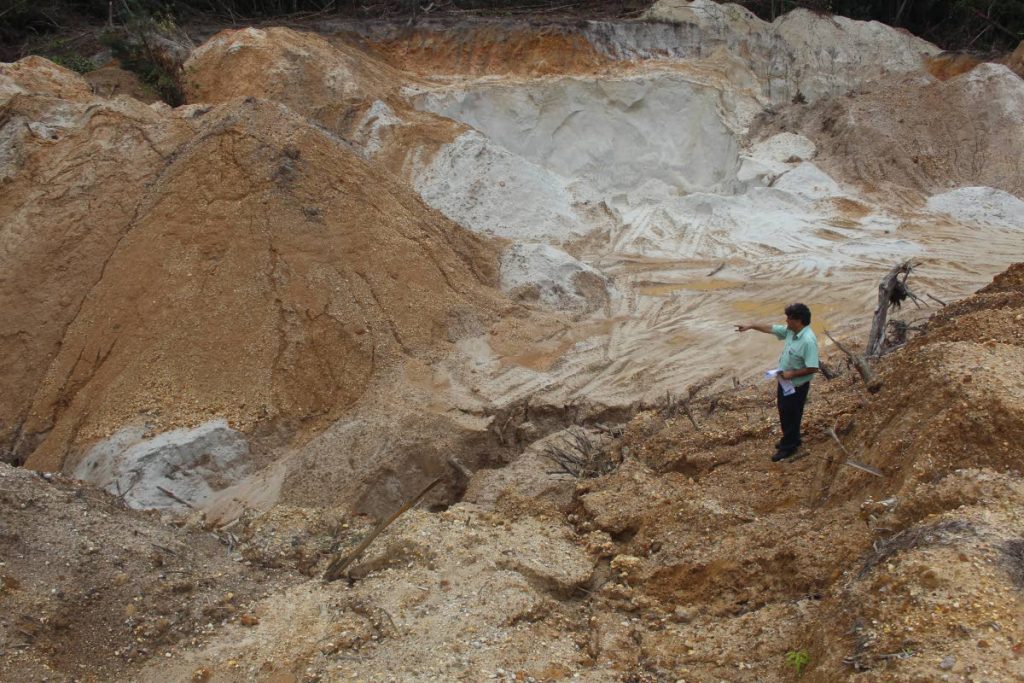Man-made and environmental danger lurks

SOURCES monitoring State lands told Newsday that tree-cover and water-ways in East Trinidad are threatened by a prevalence of squatting and illegal quarrying, such as at Melajo Forest Reserve and other areas on the Toco Old Road.
“We are losing a lot of land in this area to agricultural squatting, residential squatting, illegal quarrying, illegal planting of cannabis and forest fires. It is a struggle.”
The source said illegal activities on those lands can cause siltation of water-ways which in turn means WASA must do more to purify the water to be supplied to homes. The siltation also harms fish, aquatic life and indigenous plant-life adapted to clear waters. Loss of forest cover also harms local wildlife, he said.
Cutting down trees has also ruined the Manzanilla Windbreak Reserve. “The forest used to slow down the breeze and as the water-laden air comes in it would rise and drop rain right here. But by cutting down the forest, the rains are running down the Northern Range and possibly dumping inches of rain in Port of Spain in a short time.” He explained why the Oropuche River overflows, rendering Toco Old Road impassable. “As people cut the forest, silt enters the river whose carrying capacity is diminished and which overflows its bank faster. People don’t see these relations, but it is all inter-connected.”
While it is a pristine area that vitally contributes to the watershed that supplies the country’s drinking water, he said tackling illicit activities can be a extremely dangerous proposition especially illegal quarrying. “There were some quarrying-related murders.”
He lamented that illegal quarry operators destroy both the natural forest cover and the Caribbean Pine trees planted by the Forestry Division. He said individuals with legal quarries also steal sand and gravel from illegal mines which they then pretend comes from their legitimate quarry. “What is comical is that much of this stolen gravel is often then sold back to the Government.” The source said the area was badly hit by the illegal quarrying of aggregate during the time of construction of the Port of Spain International Waterfront Centre.
The source said so much money was being made by illegal quarrying that such interests would be defended by firearms. “Certain authorities you pay to turn a blind eye. To pay someone $10,000 a week is no problem because of the huge sums earned here illegally.”
Lamenting squatting, he said, “In past times the authorities had deemed areas here as forest reserve for a specific reason, to ensure a sustainable water supply, but now people just look at it as bush and say, ‘We want a piece of land.’”
The source said despite some squatters getting eviction notices, fresh talk of regularisation had brought fresh squatters.
“Word gets around very quickly and a whole lot of people come and put up structures.”
He said the Land Settlement Agency (LSA) and Commissioner of State Lands monitor illegal structures, while the Forestry Division curbs interference with trees.
“Some squatters get T&TEC connections, and some even get bar licences from the magistrates court. You would tend to think these are impoverished individuals, but after establishing themselves with a small ‘galvanise’ shed you start to see concrete structures going up as shops.” Newsday saw a bar, a mini-mart and a tyre shop on that reserve along the Toco Old Road. “Someone may stake out a big piece of land and then try to ‘sell’ it to others. People such as nurses, policemen and teachers come to ‘block a spot’, not to rest down their head. “It’s a money-making thing. It is not someone who has nothing and has to depend on a little shack. If you see the kind of vehicles that pull up there, it is better vehicles than you and I have.”
While State agencies aim to curb illegal squatting, he lamented that T&TEC was laying down lines to supply such settlements, saying, “It’s like two agencies working against each other.”

Comments
"Man-made and environmental danger lurks"